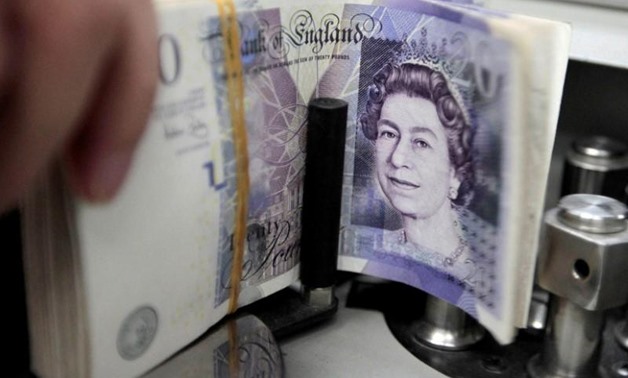
A bank employee counts pound notes at Kasikornbank in Bangkok, Thailand, October 12, 2010. REUTERS/Sukree Sukplang/File Photo
LONDON – 19 September 2017: Sterling slipped against the dollar on Tuesday, kept under pressure after a nearly 1 percent slide on comments from Bank of England governor Mark Carney, who said interest rates rises in coming months would be limited and gradual.
The pound rose as much as 3.3 percent last week, jumping more than four cents to $1.3618 on the back of hawkish messages from the BoE and Gertjan Vlieghe, one of the Bank's rate-setters normally considered a dove.
But it slid from its highest level since the Brexit result after Carney's comments on Monday, which some analysts said were aimed at managing market expectations of the pace and number of rates hikes from the British central bank.
Sterling briefly steadied above $1.35 in early morning trade in London, before gradually declining into negative territory.
It was 0.2 percent lower at $1.3477 by 0857 GMT, having earlier hit the day's low of $1.3469.
The pound was 0.4 percent lower at 88.84 pence per euro. .
Traders said the move was a continuation of yesterday's downward momentum following Carney's comments.
"It's traders digesting Carneys comments yesterday and assessing that they may have jumped the gun a little with regards to the timing of the first rate hike," said Jake Trask, corporate dealer at OFX.
"The BoE has cried wolf before regarding rate hikes and although it seems likely to happen soon, it may not be this year."
While investors will be on alert for retail sales data on Wednesday, the key event for traders this week is a speech in Florence on Friday by British Prime Minister Theresa May.
She is expected to discuss the Brexit negotiations, the next round of which has been postponed to the week of Sept. 25. Ratings firm Moody's will also issue its rating of UK sovereign debt on Friday.
In a speech at the International Monetary Fund on Monday, Carney said Brexit was likely to hurt Britain's growth prospects in the short term and push up inflation as the country adjusts to life outside the European Union.
"To guard against this (rise) it appears that the Bank of England is looking to mitigate some of the impact of higher prices by helping put a floor under the pound," said CMC Markets chief markets analyst Michael Hewson.
Britain's inflation rate has accelerated this year, due in large part to the fall in the value of the pound since the referendum decision in June 2016 to leave the EU.
Prices have risen nearly 3 percent, squeezing the spending power of many households and slowing growth in the overall economy. That, analysts say, has also complicated the BoE's job as wages continue to lag price rises.

Comments
Leave a Comment